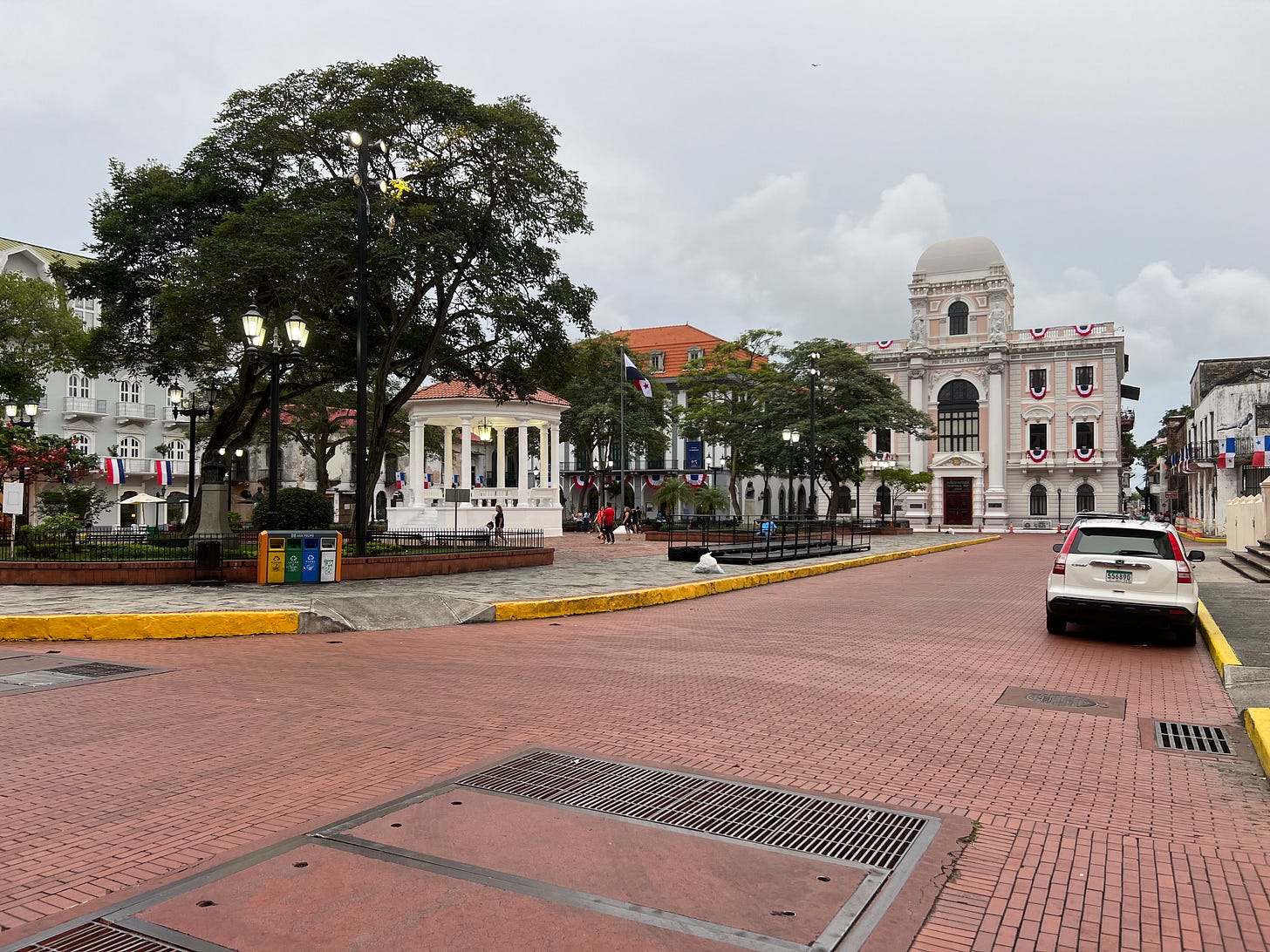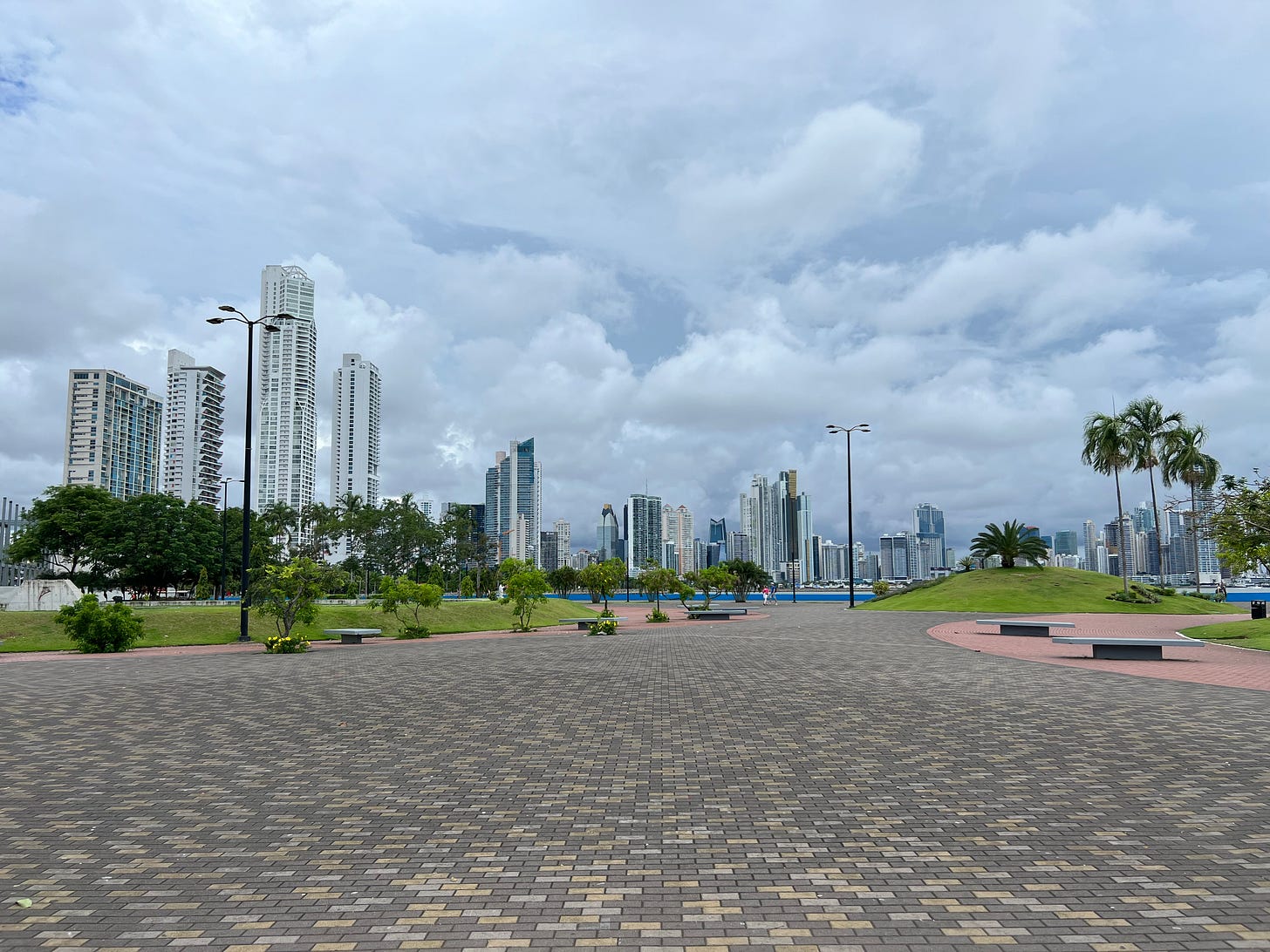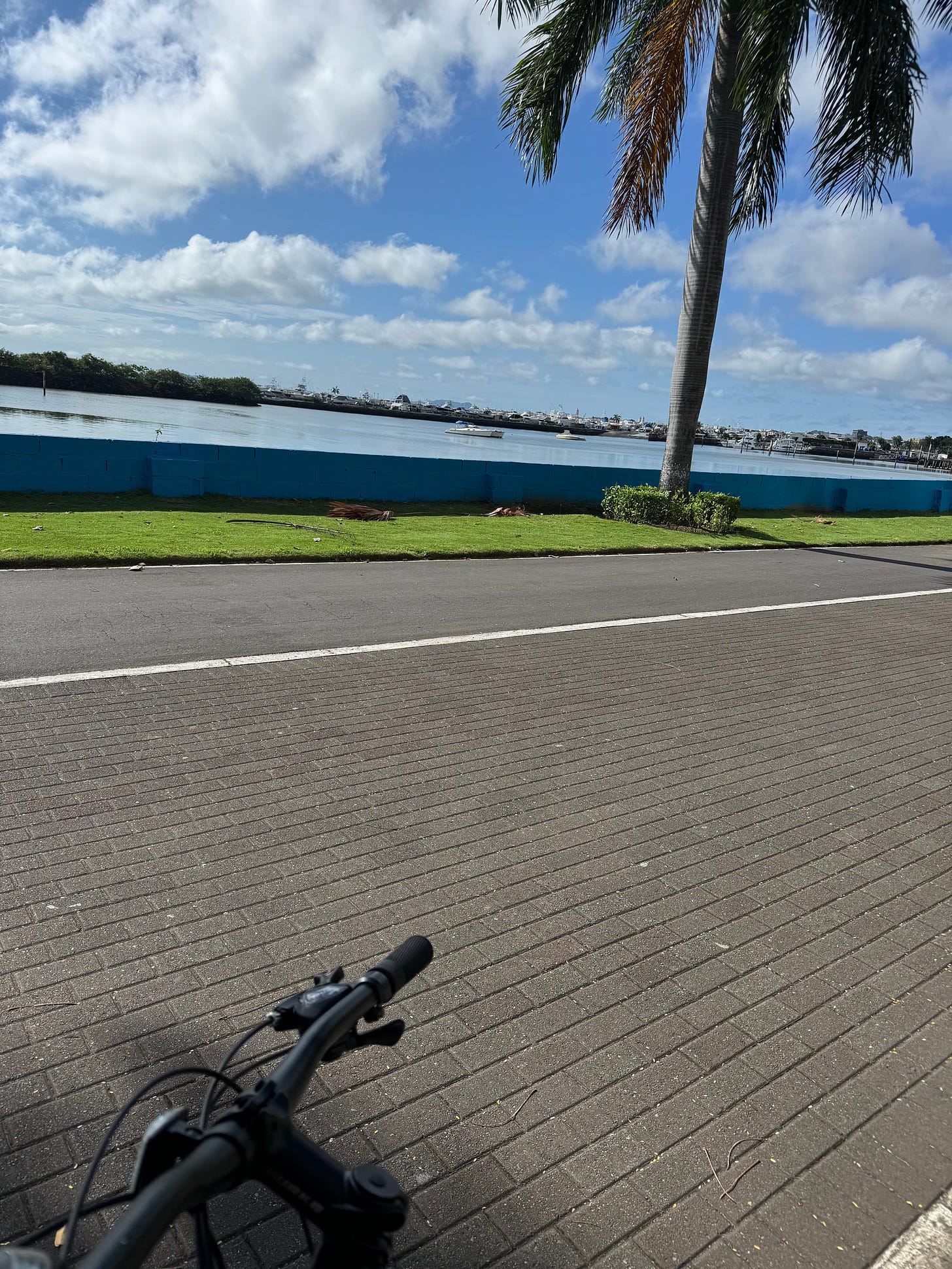Why I Chose Panama
I don't know your motivation for considering leaving your native country, albeit the US, Canada, Australia, or wherever it may be. However, like me, you are probably looking for a place that "checks the boxes" or at least most of your boxes. I moved my family to the country of Panama from the United States 2 years ago because it checks the boxes, the important ones.
No matter your age or situation, if you are looking to leap, then you are most likely seeking some combination of fun, security, cost-effectiveness, and ease of living. I mean, there is no point in selling everything, telling your family and friends, "See you later, maybe?" only to arrive and be miserable, unsafe, bored, and broke. Whether you are a corporate shill ready to escape the cubicle like myself, a self-starter multi-millionaire with a penchant for golf, an excited and ready-for-what’s next retiree, a gap-year student, or a hopeful poor artist, you want to migrate somewhere where living is sustainable cost-wise. By sustainable, I mean costs for daily living are within your realm of reason and should not fluctuate wildly. That realm of reason may be $1,500 or $15,000 a month, but you expect value for your dollar no matter your budget or where you are migrating from. Regarding security, anything can happen anywhere, and you risk being shanked by a stranger on your way to a coffee shop no matter where you live, but you hope to live somewhere where that risk is… kinda low. Right?
Well, Panama checked those boxes for us; however, as we live here, a few others remain unchecked, and that is OK.
Fun: Beyond the Tourist Highlights
First Impressions vs. Daily Reality
The first time you visit Panama City, you are amazed by the skyline, the weather, the ease of escaping customs with all your luggage, how quickly your Uber arrives, and that expansive view of the water as you saunter into downtown. You settle into your hotel and eventually hit the hot spots, namely Cinta Costera, Panama Canal, Amador Causeway, Casco Viejo, and maybe a long day trip to the San Blas Islands. It becomes clear there is tons of stuff to do, and Panama is like any other large metropolitan city.
Casco Viejo - Photographer Real Talk Panama | Expat Life
Finding Your Own Spots
You only saw a pinch of what Panama has to offer on your first trip, and you imagine all the great things there are to do. After settling in for a year as an expat, you enjoy these fun spots and become the defacto tour guide for visitors when they finally visit you, but you see less of them as daily life settles in. My wife and I found ourselves gravitating to places like our coffee shop, Cafe Unido (aside from coffee, their double cheeseburger slaps), Town Center Mall for some air-conditioned laps, followed by dinner and connecting with other parents running out their kid's energy before bedtime.
Everyday Entertainment
As I get older (in my late 40s), Panama offers my type of fun, which is essentially spaces to walk, explore, converse, eat, and repeat. I don't need rocket ships, bars open until 4 am, and loud concerts every week. I find Panama relatively conservative in its nature, including its fun and I am good with that. Now, can you "get into trouble" and find late-night spots, cigar bars, casinos, or perhaps, a zip line on a skyscraper? Of course, you can, do you boo.
However the point is that Panama offers a variety of things to do of which you can take advantage at your pace but it is not built around nor does it survive solely on these amusement areas nor the tourists and visitors who frequent them. Panama is the central banking hub of Central America, which is its core business and not tourism, yet I have and continue to find plenty of built spaces, natural beauty, rich culture, and food experiences to discover. That was an important checkmark for me.
Security: Peace of Mind Matters
My Safety Barometer
No matter your situation, you are seeking a location as safe if not safer, than where you are emigrating from. People have different motivations, and without delving into political diatribes, my interest was to live somewhere in which I felt comfortable as a male, a person of color, and where I felt my family could navigate safely. Let's first admit there is no perfect place for this. Violence can occur at any time, to anybody, for any reason, and the only thing you can do is live somewhere and behave accordingly to mitigate that risk.
My barometer for safety is to ask myself two questions:
Do I feel comfortable leaving my spouse and young child in the country as I fly out for business?
Do I feel an engagement with law enforcement has a high probability to escalate unduly?
I am not naive to think I will never be approached by law enforcement, but do I feel comfortable they would engage me only when necessary and in a relatively respectful manner without undue escalation? After spending considerable time here, I do feel comfortable in contrast to the United States.
Police Presence: Protection, Not Engagement
You will see the Policía Nacional de Panamá (PNP), aka the National Police, typically in densely populated areas such as Cinta Costera, Amador Causeway, and key landmarks such as Casco Viejo. However, you will not see or feel a strong, effervescent police presence in most neighborhoods (there are exceptions for high-crime locations, of course).
It can be jarring to be walking along Cinta Costera and seeing an ATV with two very heavily armed National Police officers riding by, their faces obscured by masks and protection gear. However, they are there for your protection, not your engagement, which I think is a critical distinction from many other countries. Most often, I see officers scrolling on their phones, as even petty crime in most tourist areas is not common.
The Private Security Culture
However, Central America does have a penchant for private security. Working in private security is like working at the US post office; it is a job, and there are plenty of opportunities. You will see unarmed, plain-marked security in and outside malls, commercial stores, and banks, and they will look at you; as a person of color, they may look at you hard. But generally, their role is to deter and report and less to follow and investigate unless they have reason to.
Panama is in the top 5 safest countries within Latin America so rest assured that living and navigating in Panama can be regarded as safe. Navigate it like you would any other country in Latin America, stay alert, take caution after dark, travel with others where possible, and walk with confidence.
Cinta Costera - Photographer Real Talk Panama | Expat Life
Cost Effectiveness: Sustainable Living
The Real Meaning of "Affordable"
When people ask me if living in Panama is cheap, I respond "it is sustainable". To me, that is more important than anything. Budgets vary, and there are generally options for all budgets, but what is important to me is not if the food at the grocery store is cheap but how much is my annual home insurance? Car insurance? Health insurance? Property taxes? Is Permanent Residency plausible? How about real estate prices? Are cars much more than in the United States?
Real Numbers That Matter
I found that pricing for the above was more reasonable than other countries, such as the United States and Canada. For example, we purchased a vehicle and I reached out to a company for a car insurance quote on what we can safely regard as a luxury vehicle. I was bracing for the worst. I knew I was going to get gauged being the gringo. Sure enough, I received a response via WhatsApp with a quote of $1200. I nearly flipped my lid. $1200 a month? Are you crazy?
I composed myself and kindly but firmly responded that although I requested full coverage with nearly every offering on a heavily optioned vehicle this amount was respectfully unacceptable. As the chat icon tapped away, I breathed hard and waited for his response. "Sir, please note this is your annual premium however we have discounts if you pay upfront...". I instantly stopped. Wait, $1200 for the full year of coverage on a luxury vehicle, and there are discounts? I thought about our car insurance in other states in the US, and this would be a near quarterly premium. The point being, this is sustainable.
Housing and Healthcare Costs
Home insurance and property taxes can also be quite sustainable relative to the value of your property. In Panama, property tax rates are progressive: 0% for properties valued up to $120,000, 0.5% for the portion between $120,001 and $700,000, and 0.7% for amounts exceeding $700,000. Plus, I have less fear of a 20% price hike in home insurance the next year because half the country caught fire or flooded the previous year. Health insurance varies on your particular needs, and several plans can supplement your needs. For example, we contracted a private ambulance and doctor service for less than $400 for the year for the entire family. They provide video-call triage services (and sent a doctor to our home for one non-urgent issue at no additional cost), provide prescriptions (sent via WhatsApp!), and offer a private ambulance we can call in the event of a true emergency. Now, this is not comprehensive care and coverage we know; however, the stance on healthcare is just different. In short, they are not out to bankrupt you.
Daily Expenses
Will you have cheaper groceries? If you buy mostly local and not imported goods, most likely yes. If you must have the Bob's Red Mill imported flour and not the local flour, you will pay more than you do at home, period. So, research the day-to-day items, but don't forget to investigate the big-ticket items as I described. If you decide to rent, even better, as you will find rentals at all price points, sizes, and locations that meet your needs.
Ease of Living: Comfort Without Compromise
Defining What Matters
Lastly, you have your definition of ease of living, but mine was relatively simple. Can I live a lifestyle relatively similar to what I am accustomed to, can I come and go as I please (residency wise) and do I have easy access to an international airport? For Panama, the answer was indeed yes.
The Cultural Balance
Now, many will say, "Don't try to replicate your home country" and "Don't bring your privileged way of life" to Panama. There is stock in this response however, you can have the majority of the comforts you are accustomed to, minus the freezing cold. You can have access to amenities, proximity to shopping and gyms, etc., just like any city without a high level of compromise. Embrace the local culture, food, and ways of living, and strengthen your patience muscle. But rest assured, you will find everything you need.
Climate Considerations
Panama is hot and humid year-round, which works for me; however, make sure it works for you. Multiple sources state the lowest recorded temperature in Panama City was 68°F (20°C), which should tell you everything you need to know. Some expats I know struggled with the humidity initially, but be patient and allow your body time to adjust. Wear light fabrics, and that does not mean shorts. Panama is not a “shorts” country unless you are at the beach. Panamanians tend to dress more formally than in many tropical countries. In urban areas like Panama City, wearing shorts outside of beaches or casual settings can make you stand out as a tourist. In fact, some places (like banks and upscale restaurants) may turn you away for wearing shorts.
Cinta Costera - Photographer Real Talk Panama | Expat Life
Residency and Mobility
Residency-wise, there are several options not just based on your age but rather if you invest in the country, have a verifiable pension, and many other scenarios. Obtaining Permanent Residency after making a real estate investment (the minimum is $300,000) gave us skin in the game and the ability to come and go as we please; staying as long as we desire. The process was not as straightforward as we had hoped - it took about 4 months longer than planned and required multiple visits to government offices - but we accomplished our goal and checked that box.
International Accessibility
For me personally, being able to leave my home and go through security at an international airport within an hour was essential for both work and personal needs. Tocumen International Airport (Code PTY) is very accessible and recently expanded and has renovated its international Terminal 2 wing with a near European airport feel. With a number of lounge options, you can arrive early and comfortably await your flight. From my door in Costa del Este, I can be at my gate within 50 minutes during off-peak hours (or in the lounge within 30).
Consider what your "ease of living" requirements are, and which are most important to you. Keep them few in number and consider them in a quantitative manner vs. "I want easy, less stress, cheap living".
Your Turn: The Panama Checklist
Are you considering moving to Panama? Here's my approach: Write down your top 10 boxes, sort them by importance and scratch off bottom 7. Focus on what truly matters to you.
For me, the top three were:
Safety for my family
Long-term financial sustainability
International accessibility
What are yours? Drop them in the comments, and I'd be happy to share specific insights about how Panama might (or might not) check those boxes for you.
¡Ven si puedes! (Come if you can!)
Please tap the heart emoji 💛 if you found this helpful!
Your "like" helps more families considering this journey discover our experience.





